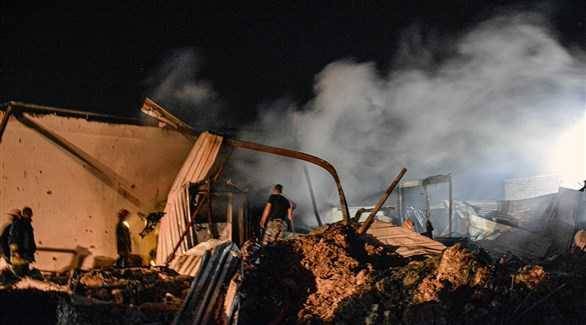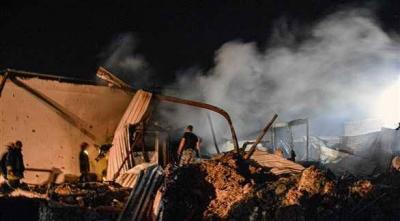Recently, airstrikes in Syria have escalated, particularly in areas where Iranian-backed armed groups are active, raising questions about the reasons behind this increase and its connections to what Israel claims are threats to its security. The latest such strike targeted an area near Damascus Airport early Saturday, which the Syrian news agency "SANA" attributed to Israel. The Syrian Observatory for Human Rights reported that Saturday's attacks marked the 25th such incident, aimed at weapons depots belonging to militias close to Tehran.
Reports regarding the recent aerial attack near Damascus Airport, which resulted in the deaths of five soldiers, indicate that Israel continues to track Iranian-backed militias, although it has not claimed responsibility for attacks typically attributed to its forces. In a speech delivered hours after the attack, Hezbollah Secretary-General Hassan Nasrallah sent condolences to the Syrian regime, stating that "the unification of resistance forces in the region is necessary, as this is the only way for Lebanese, Palestinians, and Syrians to regain their lands and recover their resources."
Since 2013, Iranian-backed Hezbollah has been overtly fighting in Syria in support of Bashar al-Assad's regime. The Syrian Observatory for Human Rights reported that "Israeli bombing targeted sites in the Ghassoulah farms near Damascus International Airport and the vicinity of Sayyida Zainab and the Kiswa area in rural Damascus, where Iranian-backed militias are stationed." Commenting on the timing of the attacks, the Observatory's director, Rami Abdul Rahman, noted that they respond to information Israel has received concerning the activities of certain Iranian-backed armed groups.
In an interview with Al-Hurra, Abdul Rahman revealed that Israel has intelligence on the activities of those militias and the weapons present there, stating, "Israel may have information about new movements from Hezbollah or Iranian militias through that area." He suggested that these attacks likely came as a response to Israeli intelligence that led it to target those specific areas. However, he reiterated that the recent strikes primarily aimed at "a weapons depot near Damascus International Airport." He added, "We do not know specifically what type of weapons were moved to the depot, but it is said to involve ground-to-ground missile systems that could be used to target drones, potentially belonging to Lebanese Hezbollah or the Iranian Revolutionary Guard."
The Observatory's director pointed out that most of the weapon depots in these areas (including those targeted by Israel) "belong to Lebanese Hezbollah." On Monday, Israeli Defense Minister Benny Gantz stated that Iran has transformed the Scientific Studies and Research Center as well as other locations across Syria into factories for long-range precision missiles designated for Hezbollah. The Scientific Studies and Research Center building in Syria has been targeted multiple times, with the last attack occurring last month, attributed to Israel by Damascus. The area surrounding Misyaf, believed to be used as a base for Iranian forces and Iran-aligned militias, has also been targeted. In the latest strike at the end of August, the Syrian Observatory for Human Rights reported that over 1,000 Iranian-made rockets were destroyed at the site during the raid targeting the center, stating, "The explosions that lasted for six hours in Misyaf in Hama countryside were due to medium-range ground-to-ground missiles produced at the Scientific Research Center under the supervision of expert officers from the Iranian Revolutionary Guard."
The True Death Toll
The Syrian Observatory for Human Rights noted that the death toll from Saturday's attacks reached seven, "including two members of Iranian militias of non-Syrian nationalities, and five from the regime's forces." Abdul Rahman reiterated what the Observatory reported, stating, "Five officers were killed along with two others of non-Syrian nationalities, possibly Iranian or Lebanese." Israel rarely confirms strikes in Syria but insists it will continue to counter what it calls Iran's attempts to establish a military presence in Syria. According to the Observatory, these unclaimed attacks by Israel constitute the 25th instance of Israeli targeting of Syria, whether through airstrikes or artillery and missile fire. The director indicated that there is significant discontent in regime-controlled areas in Syria due to the lack of response to such attacks, "and there is frustration over transforming Syria into a warehouse for storing Iranian weapons."
On September 6, the Syrian Observatory reported that Israel targeted Aleppo International Airport and its surroundings, resulting in three deaths and five injuries, leading to the airport's closure for about 72 hours. These strikes, which the Observatory indicated aimed at a depot used by Iran-aligned groups, were the second targeting of the airport within a week. Since the onset of the war in Syria in 2011, Israel has carried out hundreds of airstrikes against its northern neighbor, targeting Syrian army sites as well as Iranian and Hezbollah positions.
Frustration Among Civilians
The Israeli military justifies these strikes as necessary to prevent its arch-enemy Iran from establishing a foothold in neighboring Syria. In this context, the Observatory's director criticized what he described as "the unhelpful tone of some opposition claimants" who celebrate news of attacks that usually affect regime-controlled areas as a victory for the opposition, "which meets with discontent from civilians in those areas." According to him, the casualties of these attacks are victims of Iran and the Syrian regime, which does not respond to any of these attacks. It is noteworthy that Iran denies any connections to the armed groups targeted by these airstrikes, while affirming the presence of its armed personnel in Syria only for advisory missions.




